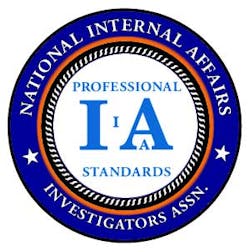I am occasionally contacted by citizens about various things. Most often they call because they are not happy with the service they receive from their law enforcement agency. Most calls are in regard to complaints. The National Internal Affairs Investigators Association is not an investigative agency. We have that information posted on our web site.
Students call requesting information regarding an administrative investigation, Internal Affairs investigation or how we do our jobs. The inquiries are mainly for a report, paper or school project. Internal Affairs investigators are the most misunderstood animal around. I have to admit, conversations with students are the best I have. All of them have their own perceptions of investigators. I put them into two distinct groups: idealist and realist. These are two distinct groups and there is no gray area when speaking with them. They are inquisitive and easily manipulated.
Recently I was contacted by a student working on a degree in criminal justice. This particular one had been an officer at one time. They had gone through an investigation that was emotionally charged. It appeared they were over it and ready to get on with life.
Deciding to complete a paper on internal affairs, they had stumbled into the internet and began their search. Utilizing the normal areas and they arrived at what I call policehaters dot com. These are sites in which the public is encouraged to complain on officers. Normally, for a small fee, they may take a complaint and promise they will sue the department only to take the money and run. These sites also list successful law suits. All of the information came from a web search engine. I talked with the student and explained the process in no uncertain terms.
During the conversation the word corruption came up repeatedly. I explained that there are few of those cases that have occurred within the past twenty years. That such investigations receive high publicity is the very nature of the beast. From the research the student was using it was easy to see that they were living in an idealistic world. The research was not completed. Progressing into the conversation it was apparent that I was dealing with an idealist.
They had conducted no follow up. I explained that the first part of an investigation is to complete an interview. Hours had been utilized on research only to be shot down. I was the first cop they had talked with and I had to point them in the right direction. I emailed them proper case law, articles, and studies. I included in an email IACP studies, case law, and other related materials. I told them to call me back within a few days and we would talk. With a little work this one will face reality.
Then I have gotten calls from those who have done a great job with research and came up with good material. They are the realist. They have looked at the information out there and talked with police officers. They have gone to IA investigators and sought out information. They dug in the right places and were shown the process. They come away with the understanding that an administrative investigation is completed without bias. In all aspects of law enforcement we need to work with interns. They are our future. If you have an encounter with one, help them get on track. These are the ones that will go on to a successful police career. They are the realist.

Randy Rider
Randy Rider has been employed as a law enforcement officer for 32 years. He is still an active law enforcement officer serving in the capacity of training and internal affairs. Over the course of his career he has conducted hundreds of investigations concerning abuse, neglect, and use of force by police and corrections officers.
Lieutenant Rider was elected president of the National Internal Affairs Investigators Association in May of 2005. The association has a members employed in agencies throughout the United States and Canada. Lieutenant Rider is also a national instructor for the Public Agency Training Council, Indianapolis, Indiana.



